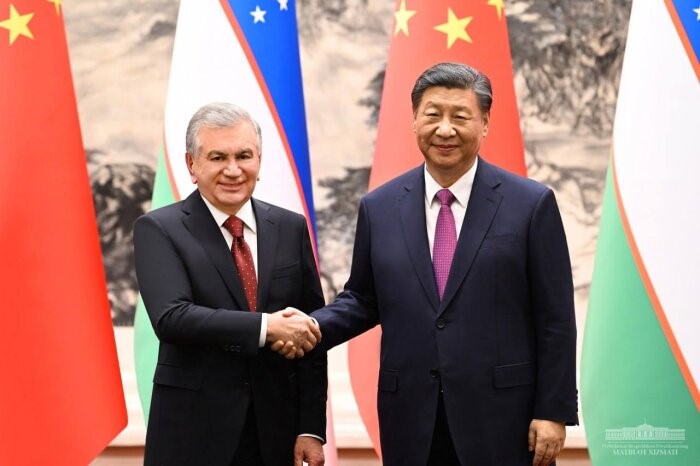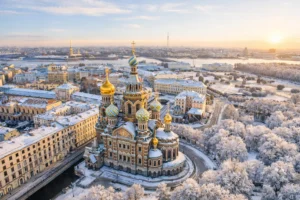President Shavkat Mirziyoyev’s Successful State Visit to China

On January 23, 2024, Uzbekistan President Shavkat Mirziyoyev embarked on a successful state visit to China, engaging in talks with Chinese President Xi Jinping in Beijing. During their meetings, both visionary leaders announced the elevation of bilateral ties to an all-weather, comprehensive strategic partnership for a new era. Their joint commitment included promoting the construction of a China-Uzbekistan community with a shared future.
Over the past two years, both China and Uzbekistan have actively participated in high-level discussions. President Mirziyoyev’s visit to China in February and October 2022 for the first China-Central Asia summit and the third Belt and Road Forum for International Cooperation and President Xi’s visit to Uzbekistan in September of the same year for the Shanghai Cooperation Organization summit showcased the commitment to strengthen ties at the highest level.
The bilateral relationship between China and Uzbekistan has led to massive transformation, moving from a “comprehensive strategic partnership” to an “all-weather comprehensive strategic partnership.” This visit will bring about closer cooperation across various projects, notably a Central Asia railway that promised to open a new trade route, bypassing the existing overland link via Russia.
Enhancing Bilateral Cooperation
They signed agreements covering cooperation in environmental protection, technical and economic collaboration, human resources development, state research institutions, scientific and technical cooperation, and joint construction of the Air Silk Road. Protocols were also established for deepening cooperation on China-Central Asia-Europe express trains.
Both countries have pledged to maintain friendly relations irrespective of the international and domestic political landscape. China expressed its readiness to expand cooperation with Uzbekistan in the new energy vehicle industry chain, photo-voltaics, wind power, and hydropower. Plans were set in motion for the early construction of the China-Kyrgyzstan-Uzbekistan railway project, emphasizing the simultaneous advancement of physical and institutional connectivity to build a multidimensional connectivity network. China initiated a new cargo transportation route to Uzbekistan from Qingdao, aiming to expedite goods movement from Yellow Sea ports.
The historical spirit of the Silk Road and the deep-rooted, vibrant friendship between the two nations were highlighted as they carried forward the legacy. President Xi Jinping stressed the need to synergize China’s eight major steps for high-quality Belt and Road cooperation, tapping into the potential of traditional cooperation, introducing trade and investment facilitation measures, expanding infrastructure cooperation, and implementing medium- and long-term cooperation plans for the economy, trade, and investment.
Plans for a long-term Program of large infrastructure projects involving Chinese partners in the water, electric, and energy grids, road, and railway industries in Uzbekistan are on the way. These initiatives aimed at strengthening cooperation in industrial fields, expanding digital and green technology transfers, and leveraging Uzbekistan’s dynamic development, vast human resources, and growing scientific-technological and production-industrial potential.
China and Uzbekistan, with rich histories as ancient civilizations, sought to harness the possibilities offered by historical ties, advancing together on the path of national renewal and development.
Bridge for Regional Connectivity
Uzbekistan placed significant emphasis on China’s Belt and Road Initiative, effectively becoming a crucial bridge for connectivity between China, Europe, the Middle East, and South Asia. Both nations shared high-level mutual trust, with Uzbekistan’s role in the Shanghai Cooperation Organization mechanism and joint efforts to counter terrorism by joint commitment extended to combating the “three forces” – separatism, extremism, and terrorism—to safeguard the security and stability of both countries and the region.
China-Uzbekistan cooperation emerged as a vital driver for China-Central Asia cooperation, playing a pivotal role in revitalizing regional integration. Uzbekistan expressed its willingness to learn from China’s successful development experience, anticipating consolidated mutual trust, expanded comprehensive cooperation, and tangible results in various fields. The two nations engaged in various forums and activities, showcasing the close friendship between their peoples and the potential of bilateral relations. Uzbekistan expressed firm support for global cooperation initiatives proposed by President Xi, highlighting its willingness to work closely with China within the SCO and other multilateral frameworks. There is hope for the acceleration of the China-Kyrgyzstan-Uzbekistan transport corridor in 2024 and expectations of enhanced cooperation in tourism, cultural exchanges, and people-to-people interactions.
China has assumed the position of Uzbekistan’s main trading partner in recent years, prompting a continuous exploration of new transport routes and corridors to enhance the supply of goods between the two countries. In 2023, trade between Uzbekistan and China saw a substantial increase, marking a 51.5% rise in turnover to $13.7 billion. The leaders agreed to increase trade volume by $20 billion over the next five years. China has become Uzbekistan’s main trading partner, leading to a continuous search for new transport routes.
President Shavkat Mirziyoyev’s successes and visions in fostering regional stability and global peace through active regional diplomacy have gained global appreciation, with many regional states joining his mission of developing connectivity as countries around the world.


